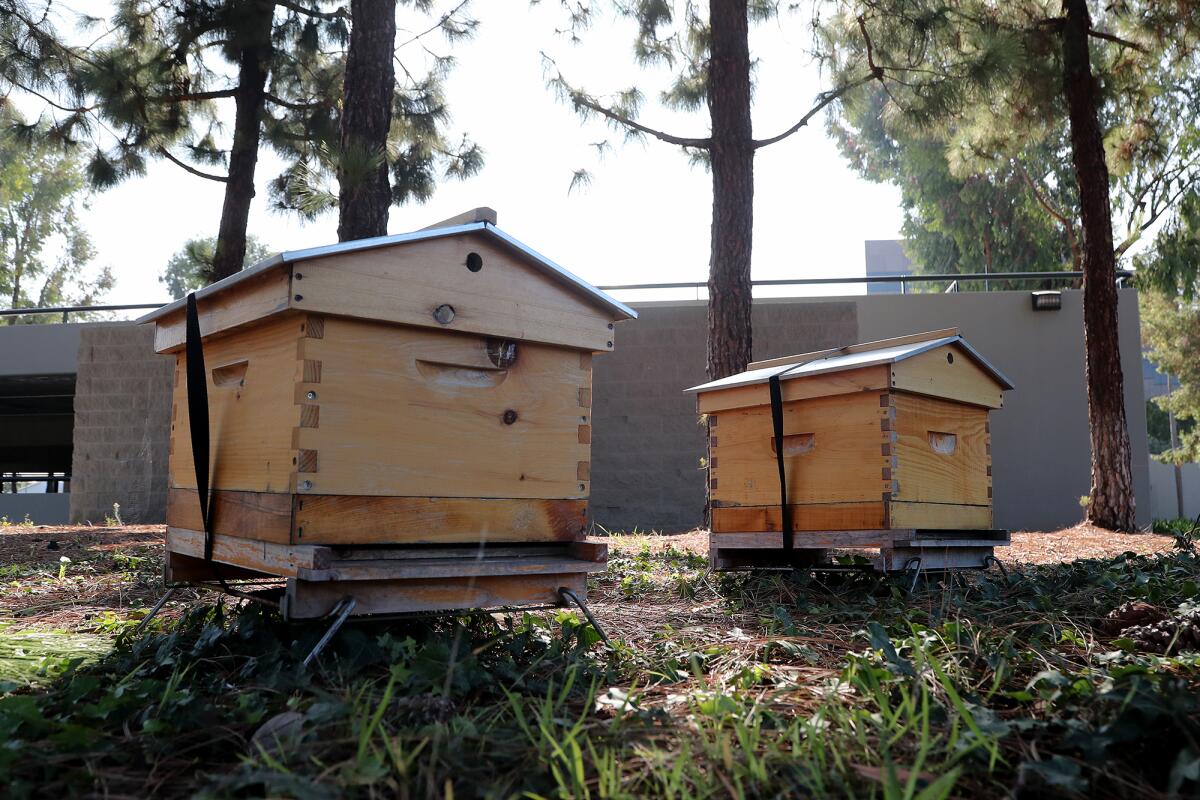Attracted by growing buzz over urban beekeeping, Costa Mesa tenants becoming eco-minded
- Share via
On the grounds of CANVAS North, a Costa Mesa campus that offers an adaptable suite of creative work spaces, two tiny house-shaped boxes are abuzz with activity as tens of thousands of honeybees begin to winter after a busy season.
Beehives installed on the property in May 2020 have since become a huge draw for tenants and a place where they can not only see bees at work, but enjoy the fruits of their labor, thanks to the Montreal-based urban beekeeping company Alveole.
Named for the French word describing a single cell within a honeycomb, Alveole installs boxes on school grounds, office complexes and other non-agrarian locations and fills them with honeybees that, once accommodated, will do what bees do.
The idea is to let urbanites interface with the insects, learn more about their role as pollinators and open doors into deeper conversations about food production, ecology and conservation, says Carmen Atwater, an urban beekeeper with the company who’s worked on the CANVAS property.

“It’s this window into a world most people don’t have exposure to in their daily lives,” Atwater said. “It really is an amazing way to tap into people’s sense of curiosity and engage with them on a very tangible level.”
Professional beekeepers tend to the hives regularly and harvest the products of the bees’ efforts, jarring honey and fashioning beeswax into lip balm and candles that are given to clients. The hives may be small, but the bees inside have already produced some major returns in their two seasons on the property.
“These hives were stacked three high before this year, because the bees were so active,” says CANVAS community manager Lauren Lengyel. “We got eight cases of honey, 100 bars of soap, 100 lip balm and 100 beeswax candles.”
Products are passed out to the site’s tenants, who are invited to take part in demonstrations on beekeeping, candle making and honey extraction. Alveole staff members also host classes where people can learn more about how bees support their local ecosystems.
Lolita Harmon is a senior property manager for EQ Office, which manages the CANVAS site and contracted with Alveole on several sites throughout Orange and Los Angeles counties. Although initially hesitant about interacting with bees, Harmon acknowledges the hives are a great value add.
“In 2019, when we started talking about it, there was a ‘buzz’ about bees,” she says. “The buzz is a part of the whole thing — it is something that sets us apart.”
Finding new and meaningful ways to engage with tenants enriches the entire business community, according to Diane Pritchett, executive director of the South Coast Metro Alliance, an economic development nonprofit that aims to attract business interests to the vicinity.
“It further promotes the Metro area as an urban center,” she says. “It’s just another amenity we have to offer our tenants and our employees.”
Aside from scoring a win for local businesses, the hives increase the number of pollinators at a time when bee populations have reached a critical low from pesticide poisoning, parasitic infection and other by-products of industrialized agriculture.
Boris Baer is a professor of pollinator health at UC Riverside’s department of entomology who works with the Centre for Integrative Bee Research, an on-campus think tank focused on improving bee health.
He says climate change and the mass shipment of bees across the country to large-scale farms, such as almond orchards in California’s Central Valley, is pushing bees beyond their natural boundaries and creating stressors that make insects vulnerable.
“Most beekeepers lose between 40% to 45% of their hives per year,” Baer adds. “In the long term, my concern is that we could see a massive decline that could have serious effects on food production.”
The movement toward urban beekeeping is one attempt to grow apian interest globally, which could be an important factor in ensuring the survival of bee populations.
“If people could fall in love again with the animal, that would help fix things,” Baer says. “People only protect what they value.”
Atwater agrees.
“The honeybees aren’t the ones who need our help, they’re just the ones who do the best advocacy,” she says. “We’re looking to inspire people to go out in their daily lives and promote biodiversity and promote all pollinators.”
All the latest on Orange County from Orange County.
Get our free TimesOC newsletter.
You may occasionally receive promotional content from the Daily Pilot.









